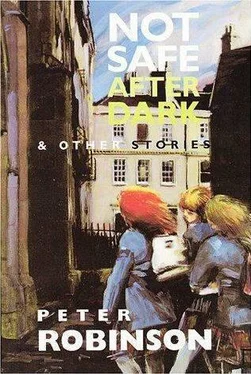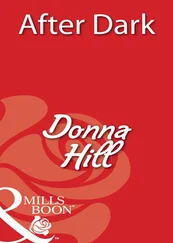Mitch walked over to the window and rolled back the carpet. Underneath was nothing but floorboards.
‘One of the boards is loose,’ said the old man. ‘The one directly in line with the wall socket. Lift it up.’
Mitch felt and, sure enough, part of the floorboard was loose. He lifted it easily with his fingernails. Underneath, wedged between the joists, lay a package wrapped in old newspaper.
‘That’s it,’ said the old man. ‘Take it out.’
Mitch did. It was heavier than he had expected.
‘Now put the board back and replace the carpet.’
After he had done as he was asked, Mitch carried the package over to the bed.
‘Open it,’ said Mr Garibaldi. ‘Go on, it won’t bite you.’
Slowly, Mitch unwrapped the newspaper. It was from 18 December 1947, he noticed, and the headline reported a blizzard dumping twenty-eight inches of snow on New York City the day before. Inside, he found a layer of oilcloth. When he had folded back that too, a gun gleamed up at him. It was old, he could tell that, but it looked in superb condition. He hefted it into his hand, felt its weight and balance, pointed it towards the wall as if to shoot.
‘Be careful,’ said the old man. ‘It’s loaded.’
Mitch looked at the gun again, then put it back on the oilcloth. His fingers were smudged with oil or grease, so he took a tissue from the bedside table and wiped them off as best he could.
‘What the hell are you doing with a loaded gun?’ he asked.
Mr Garibaldi sighed. ‘It’s a Luger,’ he said. ‘First World War, probably. Old, anyway. A friend gave it to me many years ago. A German friend. I’ve kept it ever since. Partly as a memento of him and partly for protection. You know what this city’s been getting like these past few years. I’ve maintained it, cleaned it, kept it loaded. Now I’m gonna die I want to hand it in. I don’t want it to fall into the wrong hands.’
Mitch set the Luger down on the bed. ‘Why tell me?’ he asked.
‘Because it’s unregistered and I’d like you to hand it over for me.’ He shook his head and coughed again. ‘I haven’t got long left. I don’t want no cops coming round here and giving me a hard time.’
‘They won’t give you a hard time.’ More like give you a medal for handing over an unregistered firearm, Mitch thought.
‘Maybe not. But…’ Mr Garibaldi grabbed Mitch’s wrist with his talon. The fingers felt cold and dry, like a reptile’s skin. Mitch tried to pull back a little, but the old man held on, pulled him closer and croaked, ‘Sophie doesn’t know. It would make her real angry to know we had a gun in the house the last fifty years and I kept it from her. I don’t want to end my days with my wife mad at me. Please, Mr Mitchell. It’s a small favour I ask.’
Mitch scratched the side of his eye. True enough, he thought, it was a small favour. And it might prove a profitable one, too. Old firearms were worth something to collectors, and Mitch knew a cop who had connections. All he had to say was that he had been entrusted this gun by a client, who had brought it to his office, that he had put it in the safe and called the police immediately. What could be wrong with that?
‘OK,’ he said, rewrapping the gun and slipping it in his briefcase along with the will. ‘I’ll do as you ask. Don’t worry. You rest now. Everything will be OK.’
Mr Garibaldi smiled and seemed to sink into a deep sleep.
•
Mitch stood on the porch of the Garibaldi house and pulled on his sheepskin-lined gloves, glad to be out of the cloying atmosphere of the sickroom, even if it was minus ninety or something outside.
He was already wearing his heaviest overcoat over a suit and a wool scarf, but still he was freezing. It was one of those clear winter nights when the ice cracks underfoot and the breeze off the lake seems to numb you right to the bone. Reflected street lamps splintered in the broken mirror of the sidewalk, the colour of Mr Garibaldi’s jaundiced eyes.
Mitch pulled his coat tighter around his scarf and set off, cracking the iced-over puddles as he went. Here and there, the remains of last week’s snow had frozen into ruts, and he almost slipped and fell a couple of times on the uneven surface.
As he walked, he thought of old Garibaldi, with no more than a few weeks or days left to live. The old man must have been in pain sometimes, but he never complained. And he surely must be afraid of death? Maybe dying put things in perspective, Mitch thought. Maybe the mind, facing the eternal, icy darkness of death, had ways of dealing with its impending extinction, of discarding the dross, the petty and the useless.
Or perhaps not. Maybe the old man just lay there day after day running baseball statistics through his mind; or wishing he’d slept with his neighbour’s wife when he had the chance.
As Mitch walked up the short hill, he cursed the fact that you could never get a decent parking spot in these residential streets. He’d had to park in the lot behind the drug store, the next street over, and the quickest way there was through a dirt alley just about wide enough for a garbage truck to pass through.
It happened as he cut through the alley. And it happened so fast that, afterwards, he couldn’t be quite sure whether he felt the sharp blow to the back of his head before his feet slipped out from under him, or after.
•
When Mitch opened his eyes again, the first thing he saw was the night sky. It looked like a black satin bed-sheet with some rich woman’s diamonds spilled all over it. There was no moon.
He felt frozen to the marrow. He didn’t know how long he had been lying there in the alley – long enough to die of exposure it felt like – but when he checked his watch, he saw he had only been out a little over five minutes. Not surprising no one had found him yet. Not here, on a night like this.
He lay on the frozen mud and took stock. Despite the cold, everything hurt – his elbow, which he had cracked trying to break his fall; his tailbone; his right shoulder; and, most of all, his head – and the pain was sharp and spiky, not at all numb like the rest of him. He reached around and touched the sore spot on the back of his head. His fingers came away sticky with blood.
He took a deep breath and tried to get to his feet, but he could only manage to slip and skitter around like a newborn deer, making himself even more dizzy. There was no purchase, nothing to grip. Snail-like, he slid himself along the ice towards the rickety fence. There, by reaching out and grabbing the wooden rails carefully, he was able to drag himself to his feet, picking up only a few splinters for his troubles.
At first, he wished he had stayed where he was. His head started to spin and he thought it was going to split open with pain. For a moment, he was sure he was going to fall again. He held on to the fence for dear life and vomited, the world swimming around his head. After that, he felt a little better. Maybe he wasn’t going to die.
The only light shone from a street lamp at the end of the alley, not really enough to search by, so Mitch used the plastic penlight attached to his key-ring to look for his briefcase. But it wasn’t there. Stepping carefully on the ribbed ice, still in pain and unsure of his balance, Mitch extended the area of his search in case the briefcase had skidded off somewhere on the ice when he fell. It was nowhere to be found.
Almost as an afterthought, as the horrible truth was beginning to dawn on him, he felt for his wallet. Gone. So he’d been mugged. The blow had come before the fall. And they’d taken his briefcase.
Then Mitch remembered the gun.
•
The next morning was a nightmare. Mitch had managed to get himself home from the alley without crashing the car, and after a long, hot bath, a tumbler of Scotch and four extra-strength Tylenol, he began to feel a little better. He seemed to remember his mother once saying you shouldn’t go to sleep after a bump on the head – he didn’t know why – but it didn’t stop him that night.
Читать дальше










![Джеймс Чейз - Not Safe to Be Free [= The Case of the Strangled Starlet]](/books/417649/dzhejms-chejz-not-safe-to-be-free-the-case-of-the-thumb.webp)

